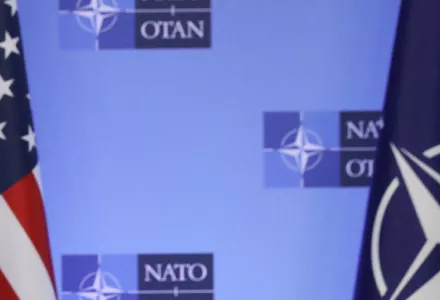
Download the Full Publication
Executive Summary
This Policy Analysis Exercise examines the role Congress can play in reforming U.S. policy toward the North Atlantic Treaty Organization (NATO). The project is intended to serve as a guide to members of Congress and congressional staff who want to influence the alliance’s priorities, capabilities, and missions. More generally, the project seeks to understand what the legislative branch can do to advance policy reform at a time when Congress’ ability to govern is hampered by high polarization and low institutional capacity.
Drawing primarily on interviews with 23 NATO experts, current and former congressional staffers, and other former government officials, the paper outlines NATO’s main challenges and explore how Congress can help tackle them. I find that even though Congress has struggled to exercise its formal foreign policy powers in recent years, it retains significant power to shape foreign policy through informal avenues of influence. These avenues are:
- Calling out wrongdoing
- Influencing the executive agenda and changing the narrative
- Informal authority, institutional memory, and longevity
- Relationships with foreign governments.
Lawmakers can use these avenues of influence in a number of ways to help address NATO’s challenges and contribute to revitalizing the alliance. This report’s recommendations for Congress include, but are not limited to:
- Request a briefing on the Biden administration’s priorities for NATO
- Participate in ongoing efforts to redefine NATO’s mission
- Use carefully framed NDAA language to focus attention on burden-sharing
- Encourage allies to meet their commitments, but be constructive
- Convene a hearing on metrics for measuring allied commitment
- Publicly highlight NATO’s under-appreciated strengths, including on China
- Help shift NATO’s narrative to highlight the alliance’s democratic values.
Although this report is about NATO, its findings suggest a general set of principles for how Congress can shape foreign policy at a time when budgets, bandwidth, and bipartisanship are all in short supply. Capitol Hill does not need to wait for major structural change before it can contribute substantively to foreign policy and national security. It is my hope that this report will equip members of Congress and congressional staff with useful tools to improve NATO and U.S.-Europe relations, while also contributing to a clearer understanding of where Congress’ true power lies.
Introduction
In 1948, the U.S. Senate passed the Vandenberg Resolution, ensuring that Congress would play a strong role in shaping the postwar relationship between the United States and Europe. The measure, sponsored by Senate Foreign Relations Committee chairman Arthur Vandenberg, effectively gave congressional approval to what would eventually become the North Atlantic Treaty Organization (NATO). Notably, the Vandenberg Resolution made clear that U.S. participation in international defense agreements would respect American constitutional procedures, a nod to the Senate’s power to ratify treaties and, more generally, to the role of Congress and the American public in influencing U.S. alliance policy. During hearings on the North Atlantic Treaty the following year, Vandenberg again highlighted the power of an individual lawmaker to shape the foreign policy debate, intentionally asking the witnesses softball questions meant to reassure his wary colleagues that the new alliance was viable. On July 21, 1949, the Senate ratified the treaty, and soon after, the United States joined NATO.
From the beginning, Congress has had a critical role in shaping U.S. involvement in the transatlantic alliance. As NATO expert Stanley Sloan puts it, “Throughout the nearly seven decades since NATO’s founding, US participation in the alliance reflected the fact that the Congress...considered itself a joint manager with the executive branch of the ‘transatlantic bargain.’” From pressuring allies to spend more on defense in the 1970s to approving NATO’s expansion after the Cold War to checking President Donald Trump’s efforts to undermine the alliance, Congress has worked both alongside and against American presidents to influence NATO’s structure, resources, priorities, and mission.
Today, it’s unclear whether Congress can play the robust role in U.S. foreign policy that it did during Vandenberg’s days. Experts and even some members of Congress believe lawmakers have “abdicated” their responsibility on foreign policy, pointing to the legislature’s inability to authorize ongoing U.S. counter-terrorism operations and the general erosion of congressional oversight powers. The executive branch’s foreign policy powers have expanded, while Congress struggles in general to pass laws given high political polarization and low legislative capacity.
Yet despite these obstacles, individual lawmakers and congressional staff members still have foreign policy and national security issues in their portfolios, and want to contribute to constructive reform on these issues. But it’s not always clear how to do so. On an issue like NATO, which rarely presents obvious opportunities for congressional involvement, it can be especially difficult to discern what part the legislative branch can and should play.
This Policy Analysis Exercise offers a guide to congressional practitioners who want to influence U.S. policy toward the NATO alliance. Drawing primarily on interviews with NATO experts, current and former congressional staffers, and former government officials, I will outline NATO’s main challenges and explore how Congress can help address them. While this report is specifically about NATO and transatlantic relations, its findings apply to other foreign policy issues where lawmakers and staff hope to exert influence. I find that Congress retains significant power to shape foreign policy even though its best-known and most formal powers in this area – authorizing military intervention, passing budgets, and exercising oversight – have been hampered in recent years by high political polarization and low institutional capacity. Congress can still wield outsize influence on foreign policy through more informal channels such as calling attention to problems, setting the agenda for the executive branch and U.S. allies, shaping the narrative about particular issues, and communicating U.S. priorities to allies.
These findings have intriguing implications for NATO. Congress can exert influence in this area in a number of ways. Among other proposals, this report recommends that Congress seek information from the executive branch on its transatlantic agenda; participate in efforts to clarify NATO’s mission; encourage better burden-sharing through the NDAA and direct interactions with allies; spur a debate about new ways to measure contributions to the alliance; and help shift NATO’s narrative by publicly highlighting its role in countering China and its democratic values. More generally, lawmakers can bolster the alliance by interacting more frequently with NATO counterparts and fostering good working ties with relevant members of the administration.
This report proceeds as follows: First, I outline the motivations behind my research and my methodology. I then outline the main challenges NATO faces today. Next, I turn to Congress, outlining its unique avenues of influence in foreign policy and proposing recommendations that draw on those avenues to address NATO’s challenges. Finally, I consider potential obstacles and caveats, and conclude by considering the implications of my findings for the legislative branch’s future involvement in U.S. foreign policy.
Sahay, Usha. “Revitalizing NATO: A Role for the U.S. Congress.” Belfer Center for Science and International Affairs, Harvard Kennedy School, September 7, 2021




